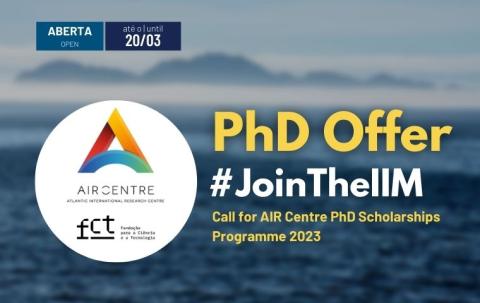Join the IIM | PhD Opportunities (AIR Centre 2023)
TheInstituto de Investigaciones Marinas (IIM-CSIC) offers a research topic to apply for a pre-doctoral fellowship at our center, within the AIR Center Doctorate Scholarships program – 2023 (Fundação para a Ciência e a Tecnologia - FCT).
The purpose of these grants is to strengthen existing collaboration ties between institutions and develop new collaborations between the AIR Center and the Portuguese scientific community, promoting cooperation between Portuguese institutions and institutions from other Atlantic countries.
The doctoral research work will be carried out at the Mariñas Research Institute, with a partial stay in Portuguese institutions.
The PhD scholarship is annual, renewable up to the maximum number of months requested in the application and cannot be granted for a period of less than 3 consecutive months or more.
Join the Institute and boost your career with us!
Why IIM?
The Institute belongs to the Consejo Superior de Investigaciones Científicas, , the largest research organization in Spain, the third in Europe and the seventh in the world.The IIM-CSIC is one of the leading marine research institutes in Spain, with a diverse activity and its own strategic units of Internationalization, Transfer and Scientific Culture. Based in the city of Vigo, we offer a dynamic research environment that promotes the career of our staff, expanding their collaboration networks and increasing their real impact on society.
We are a very competitive host institution that offers the ideal environment to promote and consolidate research staff at any stage of their career.
A project to boost your career
With regard to the AIR Center Doctoral Scholarship Call – 2023, the IIM-CSIC offer will be supervised by Antonio Padín and Fiz Pérez, both researchers in the Oceanic Processes in Global Change group. Here below, the details:
The sustained ocean carbon sink uptakes ∼37% of the fossil fuel CO2 emissions, or ∼25% of the combined fossil fuel burning and emissions due to land use changes between 1850 and 2019. This uptake of CO2 is causing profound changes in seawater chemistry resulting from increased hydrogen ion concentration (decrease in pH), referred to as ocean acidification. Experimental and modelling studies provide compelling evidence that ocean acidification will put marine ecosystems at risk especially in coastal areas that provide marine resources and important ecosystem services to support human society. The coastal ocean, which is characterized by elevated primary production and is the site for long-term burial of organic matter and calcium carbonate (CaCO3), provides a highly dynamic land-ocean interface complicated by anthropogenic perturbations that act across the land-ocean continuum and evolve over time. Including the coastal ocean as a component of the global carbon cycle is critical for developing carbon and climate policies. And, among these coastal regions, the upwelling systems are especially important by accounting for ~20% of the global fish catch in spite of constituting <1% of the world’s oceans by area. Moreover, the responses of the upwelling systems to climate changes have a strong influence on their biogeochemistry and productivity, with serious socio-economic consequences.
The aim of this study initiative, besides serving as training in the analytical aspects of different parameters of the carbon system, is also to generate the necessary knowledge on the evolution of ocean-atmosphere CO2 fluxes and ocean acidification in the upwelling system of the Iberian Peninsula, along the coast of Galicia and Portugal. This study will be divided into different task such as: i) Participation in coastal oceanographic cruises for the sampling and analysis of inorganic carbon variables and ancillary variables in the Portugal and south Galician coast in order to expand the international public databases (GLODAP-CODAP); ii) Development of a synoptic climatology of pH and air-sea CO2 fluxes in the coastal waters of the Iberian Peninsula, using feedforward neural networks trained with observations; iii) Use of multivariate and other statistical analysis to identify and quantify the environmental drivers at different spatial and temporal scale, and iv) Evaluation of the future scenarios of the marine carbonate system of the Iberian upwelling ecosystem through the model projections of the Coupled Model Intercomparison Project Phase 6 after evaluation and weighting of the same using the observations and data products obtained in the present.
This work is supported by SCOR (Scientific Committee on Oceanic Research) and progress will be presented regularly to the Portuguese Committee of this research organisation.
Profile of applicants
-
The candidates should have an academic background in marine science, marine biology, physical oceanography or marine chemistry. Skills in computing programming and database analyses are required.
Supervisors
Fiz Fernández Perez (IIM-CSIC) fiz.perez@iim.csic.es.
Antonio Padin Alvarez (IIM-CSIC) padin@iim.csic.es
Jesus Dubert (CESAM, Universidade de Aveiro)
Hosting institutions
Universidade de Aveiro (Portugal)
PhD Programme
Do*Mar – Marine Science, Technology and Management
Before completing the procedures, make sure you read the Call carefully and that you meet the eligibility requirements.
To submit your application, you must use the platform of the electronic headquarters of the Atlantic International Research Center.
The deadline for submission ends on March 20, 2023 at 11:59 p.m. (WET - Lisbon).
Each applicant may submit only one application that will refer to the research project of interest. In the case of IIM-CSIC: "Marine carbonate system in the NW Atlantic upwelling ecosystem,""
Important information

